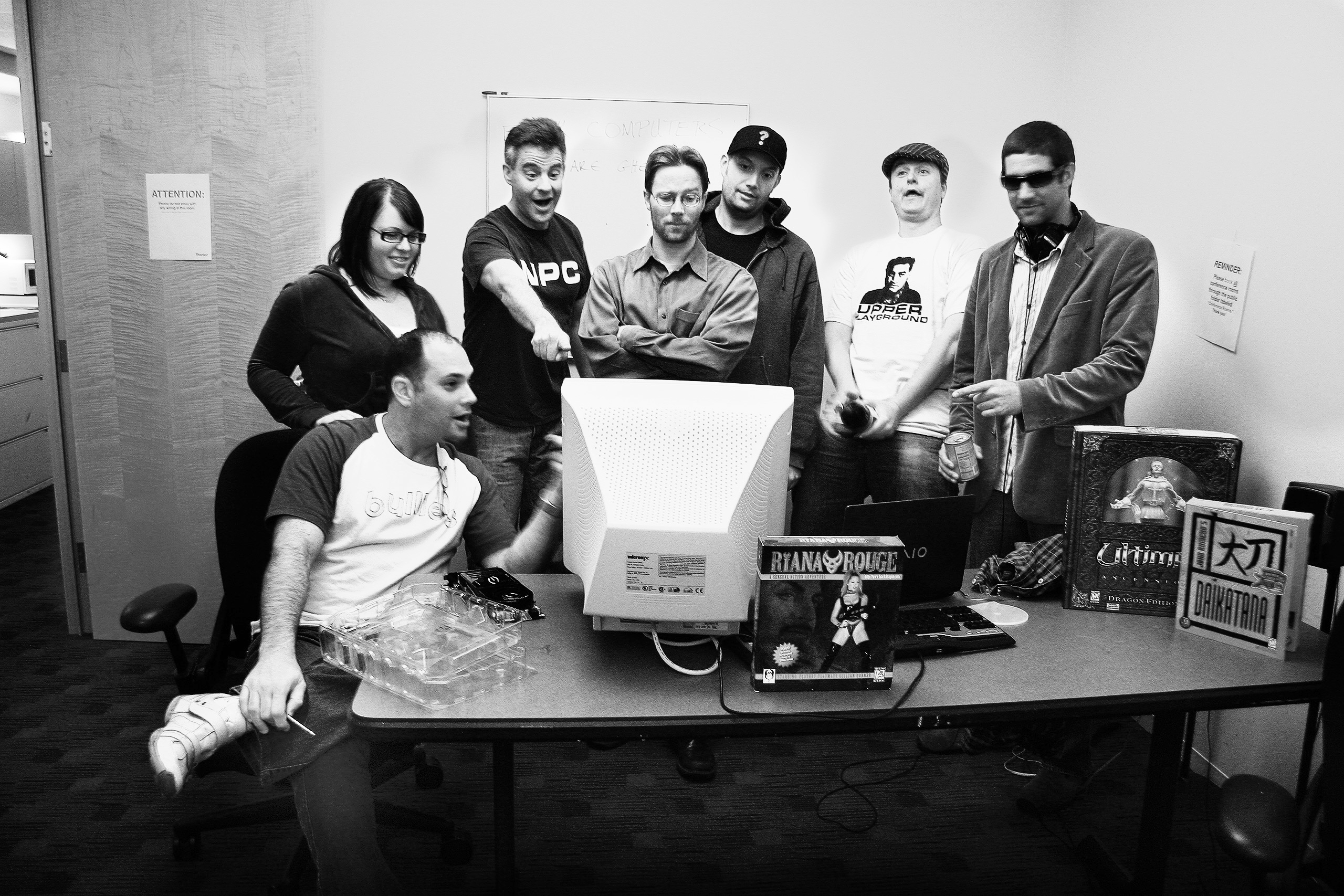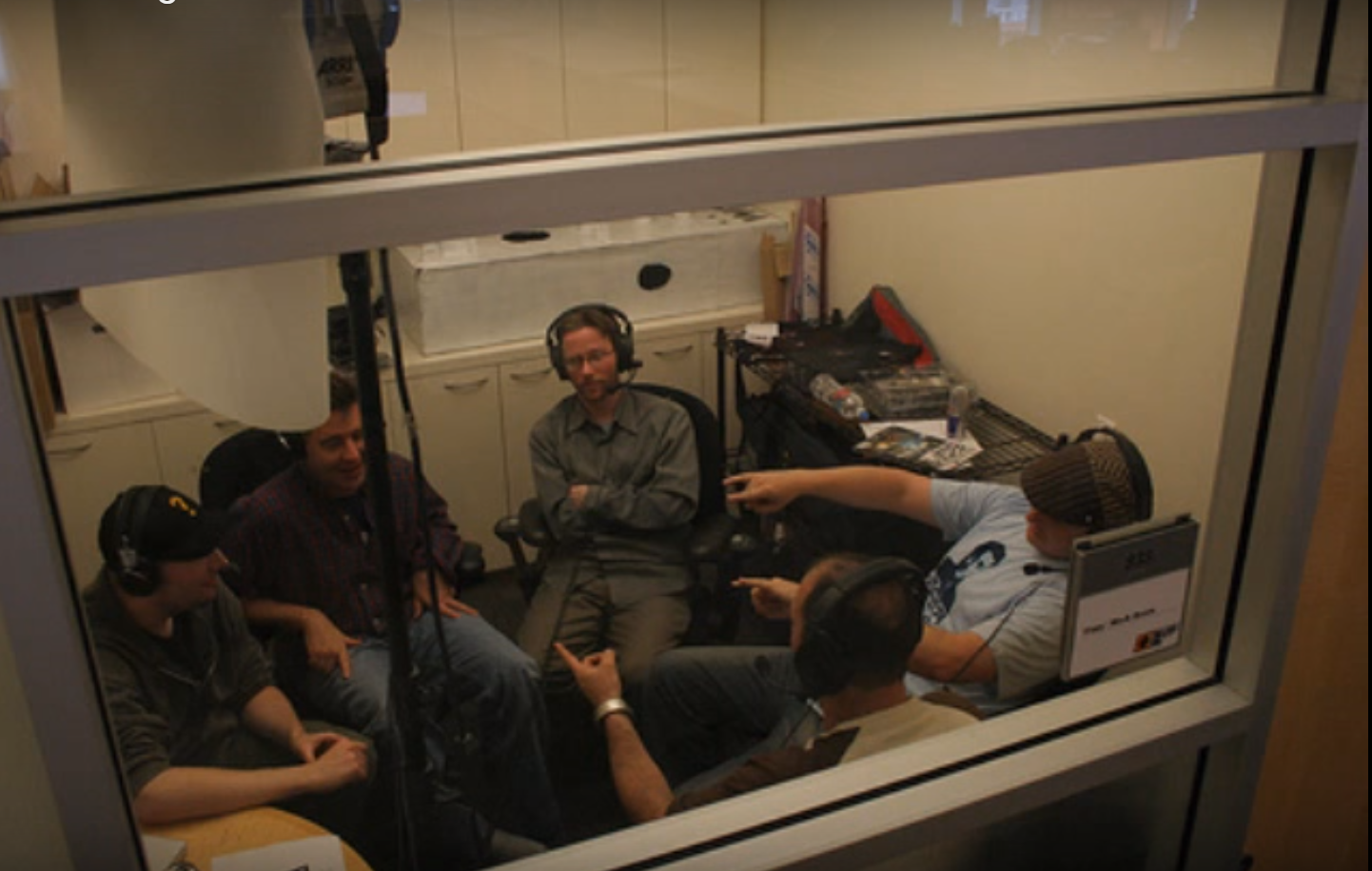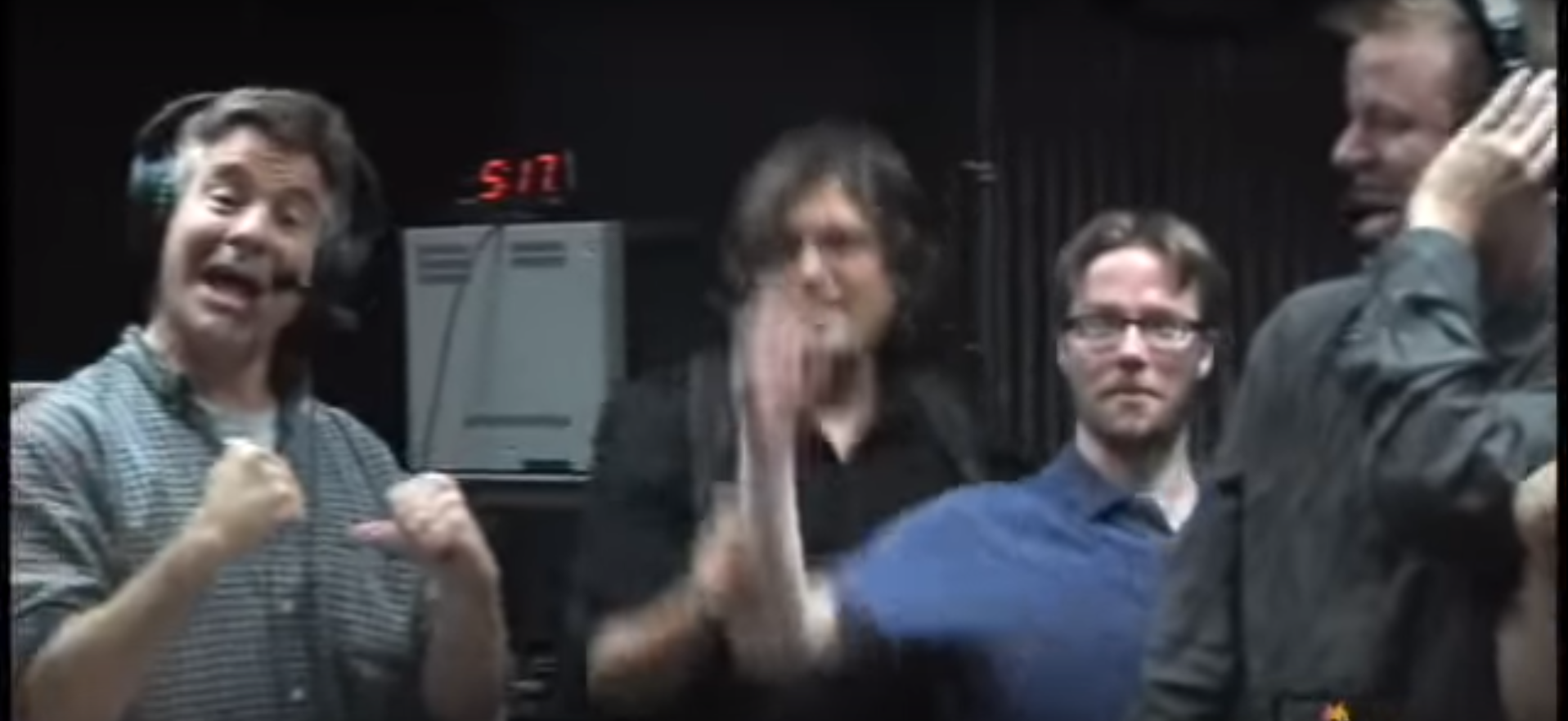Remembering GFW Radio, the podcast that changed how we talk about games forever
1UP's 97.5 The Brodeo had only 128 episodes, but it set the template for a decade of gaming podcasts to come.

The thing that made GFW Radio magical is that, at first, nobody wanted to do it.
"It was a mandate across the entire game group, that we all needed a podcast. We had no idea what that even meant," says former reviews editor Ryan Scott.
"We were resentful," adds former editor-in-chief Jeff Green. "We were print guys, we didn't want to have to talk, and also you're not paying us any more, so why should we have to add this to our list of responsibilities? I still remember the first few podcasts very clearly, we were not in a great mood. From the very beginning we were like, 'we're not going to try that hard to organize this. We're gonna just turn on the mics.'"
I wanted to see where things would go if we took the rails off.
—Jeff Green
"I think a lot of it had to do with the era shift [around that time]," remembers former features editor Shawn Elliott. "When I joined the games press I was super excited to join a magazine, because it seemed to mean so much more than working at a website—which is hilarious by today's standards. I think we perceived podcasting the same way. I was always skeptical of new technology."
Every week, the editors of Games For Windows magazine trudged downstairs to the Ziff Davis studio and recorded what eventually became one of gaming's most cherished institutions. Conceptually, GFW Radio (or 97.5 The Brodeo) was supposed to be an audio commentary for the news and features the staff was putting on a website every week. They accomplished that. GFW Radio was always a gaming podcast first, but the longer the show went on, and the more the staff became comfortable in front of the microphones, the more wonderfully deranged The Brodeo became.
Smart and stupid, fluent in the highs and lows of our wonderful, horrible culture. You listened as they dissected Relic's razor-sharp Company of Heroes map design, and also as they ventured into a sweaty forum filled with people debating how, exactly, one can get "married to Sonic." The engine was clear—vaguely disgruntled employees fucking around on company dime—and the staff's initial disdain quickly atrophied away. If you ask any of the principal members today, they all remember the podcast being their favorite thing about going to work.
It was short-lived. Only 128 episodes, recorded between February 2006 and September of 2008, before company-wide layoffs killed GFW (and Electronic Gaming Monthly, and 1UP.com.) A decade after their final cast, Jeff Green, Ryan Scott, Shawn Elliott, Sean Molloy, Darren Gladstone, Anthony Gallegos, and Robert Ashley have mostly left the media, but the GFW shadow still looms large. They showed us that the ingredients to a great gaming show are simple. You first begin with the belief that podcasts are stupid and lame, and that anyone who takes them seriously is a moron. After that, you thrive in the anarchy.
Keep up to date with the most important stories and the best deals, as picked by the PC Gamer team.
That full-throttle commitment to a lack of showmanship or professionalism became ammunition. The boys bullshitting around the office are the same boys bullshitting in the studio. Pure podcast nirvana is Shawn Elliott doing a dramatic reading of a wonderfully deranged No Mutants Allowed missive, specifically because he knew it'd make his friends laugh.
"We didn't want to do some stupid, 'What are you playing this week?' thing. We were never the kind of people who'd be like 'Oh this week Activision announced a new Call of Duty!' That was never going to be us," says Scott, who now works as the editorial director of Geekbox Media. "We used to make fun of that kind of stilted, by-the-numbers show."
Elliott distinguished himself as the star. He had this erudite, gutter-philosopher perspective of the world, and a unique ability to parse the gaming community's fringe, slimy creases. You might remember his greatest hits: the multi-chaptered sojourns into Second Life, the expert-level griefing campaigns in Team Fortress 2, the dramatic re-enactment of an Age of Conan cybersex transcription. Personally though, I remember Elliott as the man responsible for peeling back the curtain of an entire realm of grotesque imagination that was surreptitiously thriving in the underrot of the internet.

In his standout segment, "Heroes of the Web," he highlighted a particular subculture on some perverse message board, giving you just enough information to send your mind spiraling with possibilities and implications. The "Married to Sonic" odyssey is a classic, but lest we forget the woman who sold her body for enough World of Warcraft gold to buy an epic mount on Craigslist, or the boy who spoons with an imaginary Tails every evening (Sonic fandom was a frequent target).
"I've always had this thing where when I first meet people I'm a little reserved, and quiet, and not super eager. But once I'm able to relate with them I can go super crazy," says Elliott, who now designs games at 2K. "I would characterize it as that. 'Here's me with people I'm comfortable with, and I just happen to be throwing out into the world.' I could trust that they would give me charity with the things I said."
There was a decadence, and a connoisseurship, to which GFW approached the ickiness lurking in the NeoGAF dustbins, or the IRC outer rim, or the deep recesses of LiveJournal.
This became a core part of GFW Radio's dynamic: Elliott going long on something bizarre and horny, while the rest of the cast reacted accordingly. Ryan Scott carved out the sought-after reputation as the guy who seldom spoke (but when he did, was always hilarious). Gladstone could topple entire buildings with his giggle, Gallegos was a generous punching bag, Molloy was the nicest guy in the room, and Ashley was probably the smartest.
But best of all was Green, who had the unenviable position of being the boss, and at least nominally, the approving officer of record when Elliott recited dialogue from an old blaxploitation porno. The fact that he was fearless enough to let the irreverency live under his banner, knowing full well that he'd have to answer to Ziff Davis higher-ups if anything went awry, was crucial.
"I think I just didn't care. My feeling was just like, 'All of this is so trivial compared to the rest of the planet, so for us to take it super seriously was not the correct philosophical call,'" explains Green, who now works as a consultant. "I liked the idea of chaos, and anyone who ever worked for me would tell you that I've always mistrusted authority, so I was never a great authority figure. I didn't clamp down because I didn't believe in that. I thought people would do their best work if you treat them like adults. … It was natural to me to not have any rules. I wanted to see where things would go if we took the rails off."
Green's laissez-faire arbitration was influential, even among 1UP's library of popular podcasts. Even in 2019 the bulk of gaming podcasts still stick to the four-friends-in-a-living-room formula—but it needs to be said that not all of this has aged gracefully. GFW Radio was never aggressively mean-spirited, but Elliott did usually don a drawled, spit-bubble enunciation—in line with the many, many ways mid-aughties pop culture stigmatized the intellectually disabled—when he read turgid message board transcripts. (Perhaps you also remember Ralphie, the failson white-knight persona he adopted during his live trolling sessions.)
It should be okay to find some humor in someone drafting a marriage license between them and Sonic, but the subtext was uncomfortable then, and, well, extremely of its time now. This isn't something any of the GFW bona fides are interested in running from, especially Elliott, who's now a father and in a very different phase of his life, 10 years later.

"My friends and I joke about the times I've crossed the line, where I was making fun of someone with the assumption that they would never hear it, but it did get back to them and I had to apologize for it," he says. "The point I'm trying to make is not about people being 'snowflakes,' none of that bullshit. But it is easy to get caught up browsing the internet and finding some fucked up thing [and laughing about it.] ... It's cringey to think about now, but that was the era of South Park and edgy underground rappers, all that nonsense that was just about trying to say the most offensive thing you can think of."
Still, there was a decadence, and a connoisseurship, to which GFW approached the ickiness lurking in the NeoGAF dustbins, or the IRC outer rim, or the deep recesses of LiveJournal. Gaming is full of fascinating queasiness and troubling excess. Today that's common knowledge; nerd culture is giddily, openly horny, and a fresh batch of Overwatch porn arrives with every new character update. At the time, GFW Radio was the only games podcast that reflected that. It shrugged off the relative conservatism of the games media and tapped into the far more interesting folklore lurking below the surface.
At some point in time I made a difference, and it rippled forward to other folks. I can look back on it and be proud of it.
—Jeff Green
If GFW Radio had ended a few short years later, things might've been very different. Podcasting is big business in 2019. Chapo Trap House, the leftist comedy juggernaut that, consciously or not, is a spiritual successor to some of Elliott's inclinations, is currently generating over $100,000 a month on Patreon. Kinda Funny, the Twitch and YouTube upstart founded by a splinter of ex-IGNers, has more than 5,000 patrons. This probably could've been GFW's fate too, if the crowdfunding infrastructure was in place after the 1UP layoffs hit. Hindsight is 20/20 of course, and a million things could've gotten in the way, but it is something that Jeff Green thinks about.
"I think we would've gone that route. It was traumatic for us to all have to give that up. Obviously we didn't want the magazine to shut down, and by that point we all really loved the podcast too. I would imagine that all of us, without any offense to our past or future employers, would say that that was the best job we ever had. There's a wistfulness. Like, 'Damn, if we were around when there was Patreon, that would've been for sure what we wanted to do.'"
Instead, GFW lives on through condensed YouTube highlights and crystallized inside jokes, doing their best to pretend that those 128 episodes are inexhaustible. On occasion there is a reunion show where the gang rides again (usually over Skype), which is both thrilling and bittersweet for a longtime fan like me. Green also mentions that there have been offers in the past to get The Brodeo back together in a more recurrent capacity, which have never come together for natural, grown-up reasons. GFW Radio only worked while GFW itself still existed.
"So much of that podcasting is getting that weekly rush of dopamine where people are talking about the things that you've said, or are being entertained by you," says Elliott. "That's like a drug. And I think that it's really hard and scary to give up for some people."
It's a legacy that suits them: GFW Radio's influence forever undeniable, and its potential permanently unrealized. Podcasts aren't envisioned with a beginning, middle, or an end. The Bombcast is on its 10th year. Joe Rogan has recorded more than 1,200 episodes. So maybe it's okay that this one particular show is finite. Elliott, Ashley, Molloy, Gallegos, Scott, Green, Gladstone, calcified at their peak, having the time of their lives.
"People still bring up the podcast to me all the time," says Green. "Which is funny, because I've been working as a consultant for almost as long as I was at the magazine. It's super flattering, it's super nice, and it saves me from the self-pity that I'm a has-been or that I'm too old or all the things that I do to myself. I'm like, 'Okay, at some point in time I made a difference, and it rippled forward to other folks.' I can look back on it and be proud of it. We think of ourselves that way still. I think of everything in my career as 'post-that.'"
Thanks to fans, you can find the entire run of GFW Radio collected on the Internet Archive.

Luke Winkie is a freelance journalist and contributor to many publications, including PC Gamer, The New York Times, Gawker, Slate, and Mel Magazine. In between bouts of writing about Hearthstone, World of Warcraft and Twitch culture here on PC Gamer, Luke also publishes the newsletter On Posting. As a self-described "chronic poster," Luke has "spent hours deep-scrolling through surreptitious Likes tabs to uncover the root of intra-publication beef and broken down quote-tweet animosity like it’s Super Bowl tape." When he graduated from journalism school, he had no idea how bad it was going to get.

